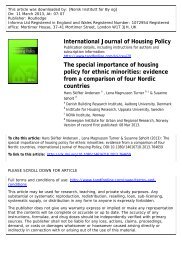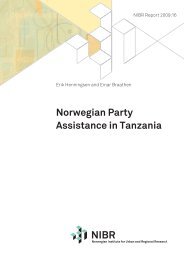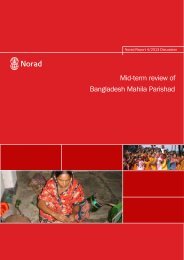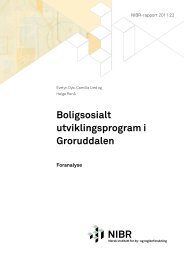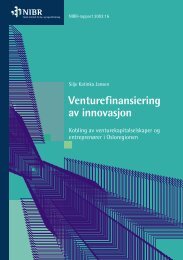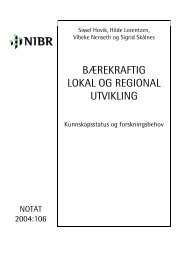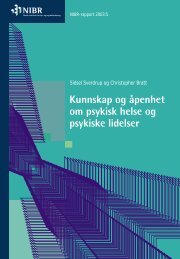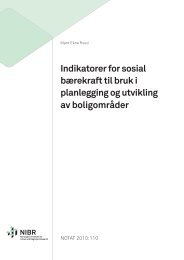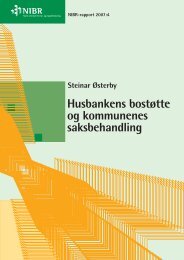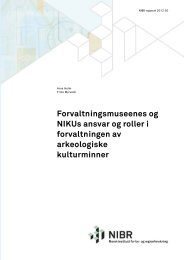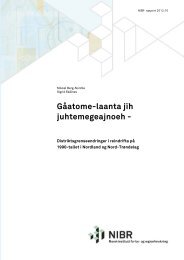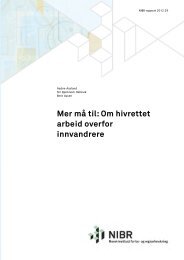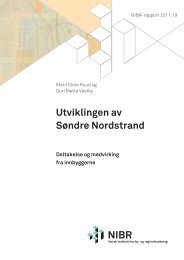Evaluation of the Southern and Eastern Africa Regional Centre for ...
Evaluation of the Southern and Eastern Africa Regional Centre for ...
Evaluation of the Southern and Eastern Africa Regional Centre for ...
- No tags were found...
Create successful ePaper yourself
Turn your PDF publications into a flip-book with our unique Google optimized e-Paper software.
2 Methodology <strong>and</strong> analytical framework17The <strong>Evaluation</strong> Team approached <strong>the</strong> assessment <strong>of</strong> impact <strong>and</strong> sustainability by use<strong>of</strong> what is termed <strong>the</strong>ory <strong>of</strong> change (TOC) <strong>and</strong> programme <strong>the</strong>ory. TOC refers to how<strong>the</strong> objectives <strong>of</strong> a programme purportedly lead to specific outputs, outcomes <strong>and</strong>impacts <strong>and</strong> especially in ‘making assumptions explicit’ in <strong>the</strong> steps taken to achieve<strong>the</strong>se ends. In many cases programmes/projects lack an explicit TOC, although <strong>the</strong>programme/project may be based on several robust assumptions about how thingschange through programme or project activities. We will <strong>the</strong>re<strong>for</strong>e bring to <strong>the</strong> <strong>for</strong>eunderlying assumptions in <strong>the</strong> <strong>Centre</strong>’s work, <strong>and</strong> discuss <strong>the</strong>ir internal validity. On<strong>the</strong> basis <strong>of</strong> <strong>the</strong> work by <strong>the</strong> <strong>Centre</strong> we will identify – schematically – how <strong>the</strong>intervention imagines <strong>the</strong> iterative sequence <strong>of</strong> actions that lead towards <strong>the</strong>objectives.Our study will hopefully lead to robust conclusions about whe<strong>the</strong>r <strong>the</strong> work <strong>of</strong> <strong>the</strong><strong>Centre</strong> (Master’s programme, graduates, regional collaboration) has worked in terms<strong>of</strong> improving women’s situation in <strong>the</strong> countries where <strong>the</strong> graduated students areworking, <strong>and</strong> not least explore to what extent this work could be improved. There is<strong>the</strong> important issue <strong>of</strong> what <strong>the</strong> appropriate level to evaluate impact should be.Impact is primarily evaluated through <strong>the</strong> contribution to developing Women’s law,<strong>the</strong> Masters course <strong>and</strong> its immediate vehicle <strong>for</strong> influence beyond <strong>the</strong> course,namely, <strong>the</strong> graduates. This focus is particularly important in light <strong>of</strong> how <strong>the</strong> <strong>Centre</strong>perceives its role <strong>and</strong> its goals <strong>and</strong> objectives. In terms <strong>of</strong> <strong>the</strong> Programme <strong>the</strong>ory <strong>the</strong>assumption made by <strong>the</strong> <strong>Centre</strong> is that by streng<strong>the</strong>ning <strong>the</strong> discipline you establish acadre <strong>of</strong> highly skilled women to advance women’s legal <strong>and</strong> social status. In additionto personal <strong>and</strong> individual impact, <strong>the</strong> application <strong>of</strong> knowledge <strong>the</strong>re<strong>for</strong>e inrespective institutional contexts becomes a key gauge <strong>of</strong> broader impact.There appears to be a conceptual gap because little is provided in terms <strong>of</strong>programme approach. Upon closer reading, however, some limited evidence can behighlighted. Again, <strong>the</strong> 2002 ‘Forward Planning’ report mentions career advancementas one avenue <strong>for</strong> impact. Fur<strong>the</strong>rmore input from a person from <strong>the</strong> NGO sectorraised concerns about how research knowledge should be applied (citing <strong>the</strong> role <strong>of</strong>dissertations in that case). It is <strong>the</strong>se kinds <strong>of</strong> issues whereby we would hope <strong>for</strong>deeper discussion <strong>of</strong> avenues <strong>for</strong> impact <strong>and</strong> in close relation, sustainability.For achieving <strong>the</strong> assessment <strong>of</strong> impact <strong>and</strong> sustainability we divide <strong>the</strong> work tasksinto 4 overlapping components which require a mixed methods approach, namely,qualitative <strong>and</strong> quantitative, as follows:1)Document analysis - key documents including funding application, reports, plans etc,were identified in <strong>the</strong> ToR, especially concerning evaluations <strong>and</strong> mid-term reviews



